The spectacle „Interrupted silence” with the participation of artists and patients of the Institute has finished the celebrations of two jubilees taking place in 2016: 25th anniversary of the program of treatment of deafness in Poland and 20th anniversary of the Institute of Physiology and Pathology of Hearing. The spectacle, produced based on an idea and screenplay prepared by Prof. Henryk Skarżyński in cooperation with Barbara Kaczyńska, had reminded not only the history of the Institute and 25 year achievements of Prof. Skarżyński and his team, it tried also to show the emotions of people who, thanks to the progress in medicine, can return to the world of sounds. These emotions had described with great empathy Prof. Henryk Skarżyński. Music to the poems of Prof. Skarżyński had composed Prof. Krzesimir Dębski. More than thousand guests had participated in the great jubilee Gala.
An important facet of the spectacle were the archival films recordings of events important for the Institute, medical world and many patients as well as texts recited or sung by the patients of the Institute and its Friends Forever. Musical setting provided the Radom Chamber Orchestra under the direction of Krzesimir Dębski. Also performing was the ProForma Vocal Group from Olsztyn under the direction of Prof. Marcin Wawruk. The Gala was conducted by Dr. Alicja Węgorzewska-Whiskerd and Rafał Królikowski.
The spectacle took place in the National Philharmonic Hall in Warsaw. It was not an accidental location. In the philharmonic concert hall, as Prof. Henryk Skarżyński often emphasizes, we have a chance to hear nearly all sounds. The possibility to hear the full spectrum of sounds is very important for our hearing. Moreover, philharmonic music can be a form of therapy for some hearing disorders. This is why Prof. Henryk Skarżyński had invited the guests to celebrate the jubilees in the philharmonic hall, to remind all that has happened in treatment of hearing loss during the last 25 years. For this occasion Prof. Skarżyński wrote a song titled ‘Do not go to a pharmacy, go to the concert hall’, dynamically performed at the concert by a duo: Hanna Śleszyńska and Robert Rozmus. It was only one of the several songs written by Professor especially for this ceremony.
„I Love Paris”
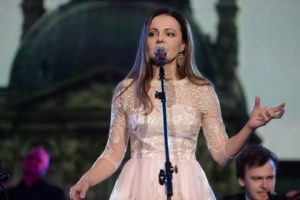 This popular song performed in a beautiful contralto one of the patients of the Institute, Basia Kaczyńska, at the beginning of the jubilee spectacle. In Paris, in the clinic directed by Prof. Claude Henri Chouard, Prof. Henryk Skarżyński had been taking his first steps in cochlear implantation. – More than 25 years ago, learning from the leaders of the European implantology – Prof. Claude Henri Chouard in Paris and Prof. Kurt Burian in Vienna – recalled during the ceremony we have managed to begin the preparations for opening the program of treatment of deafness in Poland. During his stay in Paris Prof. Skarżyński had been inspired to build a specialist center providing comprehensive care for deaf and hard of hearing people.
This popular song performed in a beautiful contralto one of the patients of the Institute, Basia Kaczyńska, at the beginning of the jubilee spectacle. In Paris, in the clinic directed by Prof. Claude Henri Chouard, Prof. Henryk Skarżyński had been taking his first steps in cochlear implantation. – More than 25 years ago, learning from the leaders of the European implantology – Prof. Claude Henri Chouard in Paris and Prof. Kurt Burian in Vienna – recalled during the ceremony we have managed to begin the preparations for opening the program of treatment of deafness in Poland. During his stay in Paris Prof. Skarżyński had been inspired to build a specialist center providing comprehensive care for deaf and hard of hearing people.
The first project that had enabled starting the program of deafness treatment on Poland had been 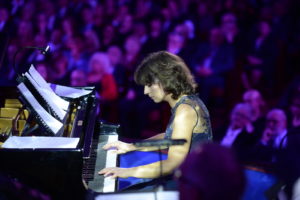 creation – on the initiative of Dr. Henryk Skarżyński – of the Foundation of Medical Development ‘Homo-Homini”. The aim of the Foundation was to organize the staff and the infrastructure for activities which would change the lives of people who have never heard and those who have lost hearing. Gradually this very complex, multispecialty program had been joined by other specialists – physicians, psychologists, speech therapists, teachers of the deaf, engineers and audiologists.
creation – on the initiative of Dr. Henryk Skarżyński – of the Foundation of Medical Development ‘Homo-Homini”. The aim of the Foundation was to organize the staff and the infrastructure for activities which would change the lives of people who have never heard and those who have lost hearing. Gradually this very complex, multispecialty program had been joined by other specialists – physicians, psychologists, speech therapists, teachers of the deaf, engineers and audiologists.
„The Implant of Hope”
In 1991, Prof. Skarżyński had presented to the Polish medical community the possibilities of treatment of deafness in Poland and in 16 and 17 July 1992 performed first cochlear implantations respectively in an adult and a child. Recollections of these years are enclosed in the poem ‘The Implant of Hope’ that the audience could hear performed by one of the patients, Prof. Mariusz Grzegorzek, the rector of the Lodz Film School. Then Małgorzata Strycharz-Dudziak, who was one of the first patients whom Prof. Skarżyński implanted with a cochlear implant in 1993, recited the poem written by Prof. Henryk Skarżyński „Enchanted Piano”. Being a talented musician, finalist of the Festival ‘Beats of Cochlea’, she played for the audience Chopin’s Nocturne Op 9 No 2.
„Institute’s Birthday”
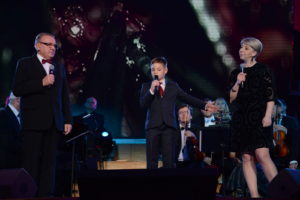 It was the title of the poem which the trio of Institute’s patients: Jan Turbański, Mikołaj Przydworski and Izabela Pajdała-Kusińska recited for the audience. Writing this poem, Prof. Henryk Skarżyński was trying to show the emotions accompanying the creation of the Institute of Physiology and Pathology of Hearing. This history in verse from was supplemented with a film describing the beginnings of work on the program of deafness treatment. Prof. Skarżyński and his team had at that time only one small room and adapted niche in the corridor, where first rehabilitation services were organized. The conditions were so hard that within one month Prof. Skarżyński had prepared the outlines of a new, modern diagnostic – treatment – rehabilitation center. But before it came to that, they had managed, in cooperation with the PFRON, to adapt a nearly entire floor of the building of flats at Grójecka St in Warsaw. In the course of 3 month the accommodations were renovated and almost exactly one year after the first in Poland cochlear implantation, on 14 July 1993, the Diagnostic – Treatment – Rehabilitation Center for Deaf and Hard of Hearing ‘Cochlear Center’ had been opened. It had been only the second center of this type in Europe. After three years of work the ‘Cochlear Center’ could boast not only many successes in treatment of hearing loss, but also large scientific, teaching and organizational output. As a mark of appreciation, based on these achievements the Minister of Health and Social Care Mr. Jacek Żochowski in collaboration with the Minister of Finance Mr. Grzegorz Kołodko and the Chairman of the State Committee for Scientific Research Prof Aleksander Łuczak had called into being, on 9 January 1996, the departmental Institute of Physiology and Pathology of Hearing.
It was the title of the poem which the trio of Institute’s patients: Jan Turbański, Mikołaj Przydworski and Izabela Pajdała-Kusińska recited for the audience. Writing this poem, Prof. Henryk Skarżyński was trying to show the emotions accompanying the creation of the Institute of Physiology and Pathology of Hearing. This history in verse from was supplemented with a film describing the beginnings of work on the program of deafness treatment. Prof. Skarżyński and his team had at that time only one small room and adapted niche in the corridor, where first rehabilitation services were organized. The conditions were so hard that within one month Prof. Skarżyński had prepared the outlines of a new, modern diagnostic – treatment – rehabilitation center. But before it came to that, they had managed, in cooperation with the PFRON, to adapt a nearly entire floor of the building of flats at Grójecka St in Warsaw. In the course of 3 month the accommodations were renovated and almost exactly one year after the first in Poland cochlear implantation, on 14 July 1993, the Diagnostic – Treatment – Rehabilitation Center for Deaf and Hard of Hearing ‘Cochlear Center’ had been opened. It had been only the second center of this type in Europe. After three years of work the ‘Cochlear Center’ could boast not only many successes in treatment of hearing loss, but also large scientific, teaching and organizational output. As a mark of appreciation, based on these achievements the Minister of Health and Social Care Mr. Jacek Żochowski in collaboration with the Minister of Finance Mr. Grzegorz Kołodko and the Chairman of the State Committee for Scientific Research Prof Aleksander Łuczak had called into being, on 9 January 1996, the departmental Institute of Physiology and Pathology of Hearing.
– That document was important because it gave us a green light to act, to work, to develop. At that time we had been a group of several friends sharing the enthusiasm and dreams about creating the highest level center for treatment of hearing disorders. And although it did not give us any financial, organizational or accommodation aid, we have managed to achieve a lot in the next 20 years! – reminded Prof. Skarżyński. 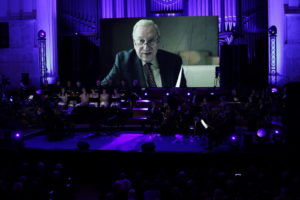
„My Friend”
A poem in rendition of Prof. Jerzy Stuhr had shown to the audience the words that Prof. Skarżyński addressed to all people who had believed in his ideas and supported his activities in his goal to create a super-modern center providing comprehensive care for all people with hearing impairments. Their names are shown in the World Hearing Center on a table welcoming all patients and guests of the Institute. The table was an idea of Prof. Henryk Skarżyński – a form of his personal thanks for all people who have exceptionally contributed to the development of the Institute, supporting it with their knowledge, scientific authority, goodwill and commitment. Prof. Jerzy Stuhr had joined the group of Friends Forever in September 2016.
„The First in the World such Surgery“
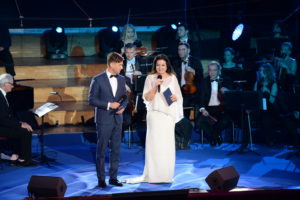 This poem of Prof. Henryk Skarżyński, recited by Alicja Węgorzewska-Whiskerd, describes the quandaries related to the first in the world cochlear implantation in a patient with partial deafness. A partial deafness in a disorder when patient cannot hear high frequency sounds while s/he retains the ability to hear low frequency tones. Once, medicine had no help to offer to patients with partial deafness. Only in 2002 Prof. Henryk Skarżyński had made a breakthrough in otosurgery, performing a cochlear implantation in a patient with partial deafness. Her name was Katarzyna Tomaszewska. A surprise during the jubilee gala was the telephone connection with one of the first patients with partial deafness, who had written a poem about a joy of getting her hearing back and explained, how important for her is the ability to speak on the phone.
This poem of Prof. Henryk Skarżyński, recited by Alicja Węgorzewska-Whiskerd, describes the quandaries related to the first in the world cochlear implantation in a patient with partial deafness. A partial deafness in a disorder when patient cannot hear high frequency sounds while s/he retains the ability to hear low frequency tones. Once, medicine had no help to offer to patients with partial deafness. Only in 2002 Prof. Henryk Skarżyński had made a breakthrough in otosurgery, performing a cochlear implantation in a patient with partial deafness. Her name was Katarzyna Tomaszewska. A surprise during the jubilee gala was the telephone connection with one of the first patients with partial deafness, who had written a poem about a joy of getting her hearing back and explained, how important for her is the ability to speak on the phone.
– Our first patient was a psychology student – recalled Prof. Skarżyński at the concert. – She had a very good understanding of risks involved in such surgery. But she was determined to get her hearing back. Her attitude was an important factor in making the decision about that surgery – said Prof. Skarżyński and the audience could watch a film with reminiscences of Katarzyna Tomaszewska.
Treatment of partial deafness had been an enormous challenge. Practically all medical community was firmly convinced that insertion of an electrode to the inner ear must irrevocably lead to destruction of the residual hearing. For this reason they believed that it is not possible to treat patients with partial deafness. In their opinion the implantation would destroy that part of the cochlea, responsible for the reception of low frequencies, which was working normally, and thus deprive a patient of his existing residual hearing. Surgical technique developed by Prof. Skarżyński, involving accessing the inner ear through the round window using a suitably flexible electrode has proven to be an effective method enabling preservation of hearing in low frequency range. There was a risk that information obtained through simultaneous electric and acoustic stimulation of the auditory receptor might not be integrated by the central nervous system. The dominating theory in otological science was that these two types of hearing cannot be combined. However, special procedure of speech processor fitting applied by the engineers from the Institute has made this integration feasible. The pioneering operation performed by Prof. Skarżyński had been transmitted ‘live’ in the Internet. It had an audience of several thousand of experts from the whole world. The successful surgery gave start to the extensive, international program of Partial Deafness Treatment (PDT).
„My medical encounters”
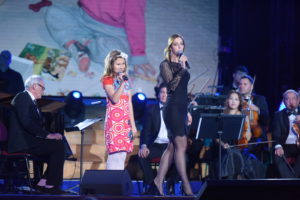 I am the first in the world patient with partial deafness provided with a cochlear implant in childhood – introduced herself Ewelina Grabowska. Then she recited a poem of Prof. Henryk Skarżyński. A film prepared especially for this occasion showed to the audience Ewelina when she was a child, after the pioneering surgery performed by Prof. Skarżyński in 2004.
I am the first in the world patient with partial deafness provided with a cochlear implant in childhood – introduced herself Ewelina Grabowska. Then she recited a poem of Prof. Henryk Skarżyński. A film prepared especially for this occasion showed to the audience Ewelina when she was a child, after the pioneering surgery performed by Prof. Skarżyński in 2004.
Proudly reciting the poem written by Prof. Skarżyński titled ‘Poles the first in the world’ two young patients: Aleksandra Kaczyńska and Roksana Pijet had described the pioneering surgeries performed in the Institute.
„In my shoes”
Karol „Pjus” Nowakowski, rapper and the first in the world patient with bilateral brainstem implants (2208) had invited the audience to a unique journey through his life and illness (neurofibromatosis type 2) in his moving song ‘In my shoes’. Especially for the jubilee gala he had prepared a video clip. The film was recorded in unusual scenery and spoke about the extraordinary strength of coping with adversities and not giving up, by himself and doctors from the Institute.
– The brainstem is usually associated with heavy trauma, brain contusion. When it turned out that it is possible to successfully stimulate cochlear nuclei in the brainstem, very sensitive locations in the central nervous system, it became our next challenge. Together with colleagues from Austria and Germany we have prepared and introduced in Poland, as the fourth country in the world, the program of treatment of deafness with auditory brainstem implants – recalled Prof. Skarżyński.
First brainstem implant surgery in Poland took place in 1998. An international team of surgeons under the direction of Prof. Henryk Skarżyński had performed in a patient Sylwia Królikowska, who was losing hearing due to a tumor, a procedure during which they had removed the tumors and implanted an ABI device. The operation took 12 hours.
Similar surgery (auditory brainstem implantation in right ear) underwent also Karol Nowakowski in 2006. Two years later he had another surgery, in which a tumor on the left side had been removed. At that time it had not been yet decided whether the patient would be provided with the second brainstem implant. It was not clear if bilateral stimulation of brainstem would be feasible and effective. Finally the team of Polish-Austrian-German experts organized by Prof. Skarżyński took a decision to operate. – It had been an important milestone in the development of this field of medicine. It demonstrated that bilateral auditory brainstem implantation brought the measurable benefits for the patient – emphasized Prof. Skarżyński. The surgery was a complete success. Patient’s hearing improved to the degree that he could devote himself to his passion – music. With two implants he recorded his third album and performed at the Festival of Polish Song in Opole.
„We have a Guinness World Record”
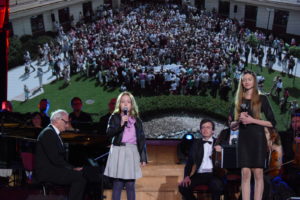 To the audience in the National Philharmonic Hall this fact recalled two patients of Prof. Henryk Skarżyński: Weronika Niczyporuk and Kornelia Pietrzyca. In a poem written by Prof. Skarżyński they described one of the most extraordinary events in the history of the Institute: a meeting of over 3 thousand patients, their families and friends who came to Kajetany to celebrate 20th anniversary of first cochlear implantation in Poland. They had won the Guinness World Record for the “Largest gathering of people with ear implants”.
To the audience in the National Philharmonic Hall this fact recalled two patients of Prof. Henryk Skarżyński: Weronika Niczyporuk and Kornelia Pietrzyca. In a poem written by Prof. Skarżyński they described one of the most extraordinary events in the history of the Institute: a meeting of over 3 thousand patients, their families and friends who came to Kajetany to celebrate 20th anniversary of first cochlear implantation in Poland. They had won the Guinness World Record for the “Largest gathering of people with ear implants”.
„Telemedicine”
A system that enables providing medical services from a distance, implemented with great success in the Institute of Physiology and Pathology of Hearing, was s subject of a song with words by Prof. Henryk Skarżyński and music by Prof. Krzesimir Dębski performed by a well-known tenor Jacek Wójcicki. Today this much extended system, the National Network of Teleaudiology, is considered to be unique on a global scale. But first teleconsultations in otolaryngology took place as early as 2000. It had been possible thanks to the technology allowing transmission of medical data and high-resolution images from selected centers in Poland to the Institute. In 2007, on the initiative of Prof. Henryk Skarżyński the Institute of Physiology and Pathology of Hearing had implemented the first in the world system of remote fitting of cochlear implant’s speech processor – telefitting. Telefitting was immediately met with great appreciation all over the world. In 2010 the Institute received in Washington the main award in the 21st Century Achievement Awards competition of the Computerworld Honors Program for its System of Remote Fitting and Telerehabilitation. Innovative solutions of the National Network of Teleaudiology are appreciated in Poland and internationally. In 2014, the Network had won the Grand Prix of the international edition of the Prix Galien competition in Monte Carlo, one of the most important competitions in the world. The song ‘Telemedicine’ was accompanied by a film presenting this newest technology and possibility of medical consultations.
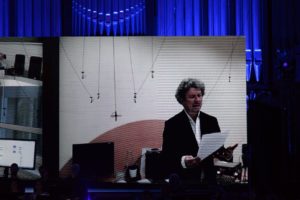 The implemented telemedical system, besides telediagnostics, telerehabilitation and telefitting includes also mass-scale hearing screening. Poland is the first country in the world implementing hearing screening in school age children.
The implemented telemedical system, besides telediagnostics, telerehabilitation and telefitting includes also mass-scale hearing screening. Poland is the first country in the world implementing hearing screening in school age children.
– Hearing screening is a perfect example of broad thinking about early prevention and detection of different disorders that influence personal development and everyday social interactions – said Prof. Skarżyński introducing yet another thread of Institute’s activities. – A confirmation of the importance of this program is the Europe-wide interest and appreciation for the long-term work and achievements of the Institute in this field.
A topic proposed and coordinated by Prof. Henryk Skarżyński in cooperation with the Department of Mother and Child, Ministry of Health ‘Equal opportunities for children with communication disorders in European countries’ had been accepted as a public health priority of Polish presidency in the EU Council. During the half year of this presidency the experts from the Institute had successfully drawn the attention of politicians and representatives of the community and member country institutions to the scale of the incidence of problems with hearing, vision and speech among the children in Europe, to the consequences of neglecting the treatment of these disorders as well as present the solutions allowing to limit the burden of these problems. As the most effective had been indicated the universal screening programs in school and preschool children. The effect of works of the team of the Institute and negotiations conducted during the presidency was the adoption by the ministers of health of all EU member countries at the EPSCO Council meeting in Brussels of the ‘EU Council Conclusions on early Detection and Treatment of Communication Disorders in Children, Including the Use of e-Health Tools and Innovative Solutions’. It was a key event finalizing the activities implemented during Polish EU Council presidency with relation to levelling the opportunities of children with communication disorders that had been an integral part of the public health priority. The Conclusions were an important document drawing the public attention to the problem of communication disorders and their consequences for the normal intellectual and emotional development of children and as a consequence for their social and economic status in adult life. The Conclusions encourage the governments of member countries and other appropriate institutions to undertake the activities aimed at detection and treatment of disorders of hearing, vision and speech in children such as effective and economically justified screening programs and taking the full advantage of opportunities offered by modern technologies and e-Health tools. It highlights the role of prevention and monitoring as well as an active involvement of parents, caretakers and teachers. The Conclusions stresses also the importance of strengthening the international collaboration with regard to communication disorders. It encourages also the member countries and the EU Commission to take into consideration topics relating to communication disorders, particularly with regard to problems requiring an exceptional concentration of knowledge, experience and resources, during the works on the European Reference Networks described in the Directive 2011/24/EU on patients’ rights in cross-border healthcare. A very favorable climate towards preparation and adoption of the EU Council Conclusions had been created in the months preceding Polish presidency in the EU Council. Collaboration of experts representing the European associations of audiologists, otolaryngologists, ophthalmologists, phoniatricians and speech therapists initiated by the Institute of Physiology and pathology of Hearing had resulted in signing – on the initiative of Prof. Henryk Skarżyński – of the two European Scientific Consensus Documents in Warsaw on 22 June 2011. The Consensus Documents had been agreed and signed during the 10th EFAS Congress organized by the team of the Institute, taking place for the first time in Poland.
– Some of programs we had created had a decisive impact on the development of otology, audiology and otosurgery – said Prof. Skarżyński. – I thin not only about the cochlear implant program or hearing implant program, but also hearing screening in newborns and schoolchildren and population studies involving children in rural areas of Poland. Two years ago we had created the International Consortium for Hearing Screening, which is successfully conducting the ‘Program of early detection of hearing disorders for levelling the education opportunities of children on four continents’. The consortium comprises medical centers in countries including: Armenia, Kirgizstan, Moldova, Romania, Senegal, Tajikistan and Ivory Coast. In all of these countries, as well as in Ukraine, in western Siberia, Azerbaijan, Congo, Ruanda, Tanzania and Columbia our specialists had conducted the pilot hearing screening programs in schools – added Prof. Skarżyński.
„A footprint on Earth”
Reciting this poem written by Prof. Skarżyński, Wiktor Niedzicki took the audience for a virtual walk through the World Hearing Center opened on 12 May 2012. – It has always been very important to me to give patients a new hope and new chances for therapy – recalled Prof. Skarżyński. – This is why I had decided to implement in Poland the program of partial deafness treatment and to build in Kajetany the first in the world Partial Deafness Treatment Center. The Institute was lucky to obtain EU funding from the Program Innovative Economy that has covered two thirds of construction costs. One third of costs we had been able to cover from our own reserves. With these funds we had been able to build this extraordinary center in Kajetany in only one and half years. We had changed its name to a simpler version – the World Hearing Center. The ceremonial opening took place in the presence of the Prime Minister of Poland, the Marshal of the Sejm and the eminent personages of science and medicine from Poland and abroad – added Prof. Skarżyński.
„The world I can hear”
The audience in the Philharmonic Hall had enthusiastically welcomed the song presented by Basia Kaczyńska and Maciej Miecznikowski, the anthem of the first in the world International Music Festival for Children, Youths, and Adults with Hearing Disorders “Beats of Cochlea”. The Festival is the project created by Prof. Henryk Skarżyński and an idea aimed to show to the wide audience the musical talents saved thanks to the progress in science and medicine. Until present day two editions of the Festival took place, with participation of implant users from the whole world, even such countries as China, United States or Argentina. Among its finalists there were six patients of the Institute. One of them – 27 years old Grzegorz Płonka, laureate of the Festival and a patient of Prof. Skarżyński, had won the hearts of the audience not only with his wonderful interpretation of Beethoven, but also with the story of his life. For 14 years he had undiagnosed profound hearing loss. Because of his multiple handicaps and strong tactile hypersensitivity he had been treated as an autistic child. Unable to communicate with his environment, he tried to play piano. The music became his entire world. For the audience in the Philharmonic Hall Grzegorz had played a piece he had composed on his own titles ‘A clock’.
„I can hear the voice of my mother”
The final of the artistic part of the gala was the performance of a patient of Prof. Skarżyński Olaf Kaca who, with the accompaniment of the ProForma Vocal Group from Olsztyn, had chanted a moving poem written by Prof. Henryk Skarżyński, describing the emotions of deaf children and joy they can feel hearing their mother’s voice for the first time. Breaking of the surrounding silence changes their lives completely and boosts their hearing and speech development.
Emotions of patients who thanks to medical progress could get back their hearing, described in poems of Prof. Henryk Skarżyński, were present also in a poem ‘To hear and to speak’ declaimed by the eminent actor Ignacy Gogolewski. With great conviction he had recited the words:
„To hear – means to understand the other person talking to you.
To understand what he or she is trying to tell you.
And to communicate easily with the other one
To let the other side to feel the joy too.”
And Rafał Królikowski had said in a poem how valuable the voice is.
A special place in the artistic part of the gala was reserved for the songs performed by the masters of the Polish scene Hanna Śleszyńska, Anna Jurksztowicz, Robert Rozmus, Ryszard Rynkowski and Dominika Kościelniak. It was both funny and thought-provoking. The duo Hanna Śleszyńska and Robert Rozmus had sung a song ‘Do not go to a pharmacy, go to the concert hall’ written by Prof. Henryk Skarżyński and Krzesimir Dębski, playfully pointing out that music is important in treatment of hearing disorders. Ryszard Rynkowski had sung a nostalgic „Ballad about hearing” repeating in the chorus that ‘every sound is a ray of sunshine’. There were also musical surprises prepared by the singers. Anna Jurksztowicz had presented a specially prepared for this occasion version of „Dumka na dwa serca” and Maciej Miecznikowski had sung his own song „Jak dzikie konie”. Dominika Kościelniak in an operatic voice had sung the song „Gdy odzyskałam słuch”.
The ceremony celebrating the history of 25 years of treatment of deafness in Poland and 20 years of the Institute of Physiology and Pathology of Hearing was coming to the end. Special thanks for Prof. Skarżyński and his team had presented the patients of the Institute at the end of the gala, thanking for their fight and tenacity in restoring them to the world of sounds.
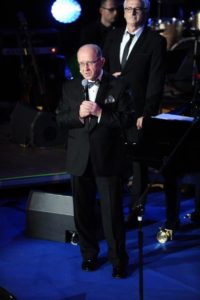 – Thank you very much for all these warm words addressed to me and my team – said at the end Prof. Henryk Skarżyński not trying to hide his emotion. – If our work can contribute to strengthening of the position of Polish science and – more dear to me – medicine, I promise we will continue to do our best not to disappoint you – assured Prof. Skarżyński the audience.
– Thank you very much for all these warm words addressed to me and my team – said at the end Prof. Henryk Skarżyński not trying to hide his emotion. – If our work can contribute to strengthening of the position of Polish science and – more dear to me – medicine, I promise we will continue to do our best not to disappoint you – assured Prof. Skarżyński the audience.
Extraordinary celebration, extraordinary guests
The gala ceremony was honored with the presence of guests including the Secretary of State in the Ministry of Health Jarosław Pinkas, the Secretary of State in the Chancellery of the President of Poland Andrzej Dera, H.E. Cardinal Bishop Kazimierz Nycz, Metropolitan of Warsaw Zdzisław Sipiera, Voivode of Mazowsze, vice-chairman of the European Academy of Sciences Prof. Michał Kleiber and many representatives of the Sejm ad Senate of Poland, rectors and deans of universities, directors of the departmental institutes and of the Polish Academy of Sciences, many Polish scientists, sportsmen, artists and businessmen.
An especially nice accent for guests and employees of the Institute were the congratulatory letters from the President of Poland Andrzej Duda, Marshall of the Sejm Marek Kuchciński, Minister of Health Konstanty Radziwiłł, Secretary of State in the Ministry of Health Jarosław Pinkas, Marshal of the Senate Stanisław Karczewski.
The President of Poland Andrzej Duda: The jubilee of 25th anniversary pf the program of treatment of deafness in Poland and 20th anniversary of the Institute of Physiology and Pathology of Hearing it is a beautiful anniversary of the spectacular successes resulting from your hard work, long years of research, searching for the innovating programs of prevention and treatment of one of the most important of the sensory organs. It is a valuable contribution of Polish physicians to the world’s otolaryngology and to overall medical progress. (…)
The Marshal of the Sejm Marek Kuchciński: (…) On the occasion of double jubilee I would like to congratulate Professor Skarżyński and his team and thank them for their work for the benefit of patients and Poland, because your extraordinary results contribute to the progress of Polish science and medicine. It should be noted that your achievements have placed Polish otolaryngology at the very top of the world’s medical science. The Institute of Physiology and Pathology of Hearing, which you had created, is the best, the most modern and best organized center for treatment of ear disorders in Poland, enjoying an exceptional esteem also internationally. Achievements of your team attest to the superb abilities of Polish specialists. (…)
The Minister of Health Konstanty Radziwiłł: (…) on this occasion I would like to convey to you the expressions of appreciation for all people involved in the everyday work of the Institute. I thank you for your daily toil and efforts which are reflected in your many successes, as everybody knows ‘the success is not a coincidence’. It is hard work, tenacity, study, analysis, commitment and first of all love for what you are doing. (…)
The Marshal of the Senate Stanisław Karczewski: (…) I am glad that in the year of jubilees of such importance for the Institute the gala ceremony brings together the employees, partners, patients and friends of this extraordinary research and medical center. For many years the highly specialized team of experts had been providing the comprehensive care for people with disorders of organs of hearing, voice, speech, balance and breathing. It is impossible to overestimate the attainments of the Institute and most of all your, Professor Skarżyński, contributions to development of the innovative methods of treatment. Filled with admiration for your accomplishments, knowledge and experience I congratulate you most heartily on the occasion of these jubilees. I wish you many further successes in treatment of hearing disorders and unfailing satisfaction in achieving your plans and projects.
The particularly warm words had spoken the friend of long standing of the Institute, the Secretary of State Jarosław Pinkas, who had said: I congratulate most cordially. I congratulate Professor Skarżyński, without whom we would not be here. Without him there would be no so many consultations, so many happy, hearing people, such prestige of our country on the international scene and such real, intelligent example of good management, success and achievement for all who want to succeed in their fields. (…)





